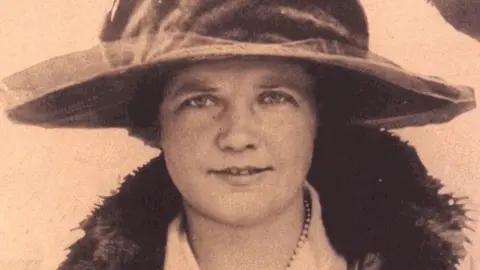Hidden Heroines: Will Lady Rhondda win your statue vote?
 Parasol Media Ltd
Parasol Media LtdCardiff's first statue of a named woman forgotten to history is to be decided by a public vote.
Five women have been shortlisted for the artwork which will be placed outside BBC Wales' new headquarters at Central Square.
The women, none of whom are still living, are Cranogwen, Lady Rhondda, Elizabeth Andrews, Elaine Morgan and Betty Campbell.
BBC Wales is profiling the lives of each of these women and the public can vote online until 21:30 GMT on Wednesday.
Here we look at the life of Lady Rhondda.
Lady Rhondda, born Margaret Haig-Thomas in Llanwern, Newport, in 1883, was a woman of privilege, but she used that privilege in the best way possible - to fight for the rights of all women.
She did things few other women of her background would have dared.
 Getty Images
Getty ImagesShe was a suffragette who made the fight for the vote front page news. She brought Emmeline Pankhurst to Wales and spearheaded the suffrage campaign among the women of Newport.
She confronted the anti-suffrage Prime Minister Asquith by jumping on his car. She set fire to a post box and was sent to prison, where she went on hunger strike.
In the First World War she ensured women played a vital role, recruiting them into the women's services, including in her role as Commissioner for Wales in the Women's National Service Department.
Crossing the Atlantic, she survived the sinking of the Lusitania when it was torpedoed during the war, claiming more than 1,100 lives.
Struggling to survive for hours in freezing water, the trauma proved a pivotal moment for Lady Rhondda.
"What it did do was to alter my opinion of myself," she had said.
"I had lacked self-confidence… and here I had got through this test without disgracing myself. I had found that when the moment came, I could control my fear."

After the war, Lady Rhondda campaigned for the rights of women workers who did not want to be pushed back into the home.
She also continued the fight for the final phase of women's suffrage which saw all women get the vote in 1928.
Lady Rhondda was the greatest global businesswomen of her era, sitting as she did on the board of 33 companies, chairing seven of them, and overseeing an industrial empire of mines, shipping and newspapers.
She also became the first and, to date, only female president of the Institute of Directors.
As a journalist, she created and edited a ground-breaking and hugely influential weekly paper called Time and Tide, which featured some of the literary giants of the 20th century - from George Orwell and Virginia Woolf to JRR Tolkien.
Exploring Welsh, British and international politics as well as the arts, Time and Tide was one of the key journals of the interwar period.
A remarkable figure
Lady Rhondda argued that women's voting rights must be accompanied by social and economic legislation.
Her programme sought legislation for mothers that would give better protection to children and widowed and unmarried mothers.
Her other other battles dealt with equal rights for men and women, demanding equal guardianship of children for married parents, equality of opportunity in the civil service and equal pay for teachers.
 Getty Images
Getty ImagesAnd Lady Rhondda is the reason women of today can sit in the House of Lords. She campaigned for female peers for 40 years, though sadly she died after the law she fought for was changed, too late to take her own seat.
Any one of these individual achievements would have secured her place in history - put them all together and Lady Rhondda remains one of the most remarkable figures Wales has ever known.